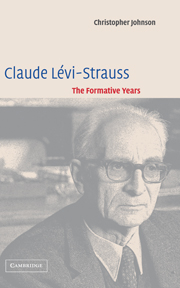Book contents
2 - The model of exchange
Published online by Cambridge University Press: 05 June 2012
Summary
La théorie de la réciprocité n'est pas en cause. Elle reste aujourd'hui, pour la pensée ethnologique, établie sur une base aussi ferme que la théorie de gravitation l'est en astronomie.
(It is not the theory of reciprocity which is in doubt. In anthropology this theory continues to stand, as soundly based as the gravity theory in astronomy.)In his earlier work, like many anthropologists of his generation, Lévi-Strauss draws attention to the necessary and urgent task of maintaining and extending the empirical foundations of anthropology in the practice of fieldwork. This is seen as especially critical in the case of France, given the relatively late development of the discipline in the country. As his more empirically minded critics have never tired of pointing out, Lévi-Strauss's own fieldwork experience was a comparatively limited one, and he is by inclination a theorist rather than a fieldworker. This personal bias is freely acknowledged by Lévi-Strauss himself; in his mind, the imperative of data collection is matched by the necessity of bringing some order and coherence to the abundance of material it has generated. The idea of the infinite extension of data and the problem of its synthesis is a constant leitmotif of Lévi-Strauss's structuralism. Biographically, it might be traced back to his post-fieldwork experience in North America, where over a period of several years he assimilated the mass of anthropological literature deposited in the New York Public Library.
- Type
- Chapter
- Information
- Claude Lévi-StraussThe Formative Years, pp. 31 - 67Publisher: Cambridge University PressPrint publication year: 2003



